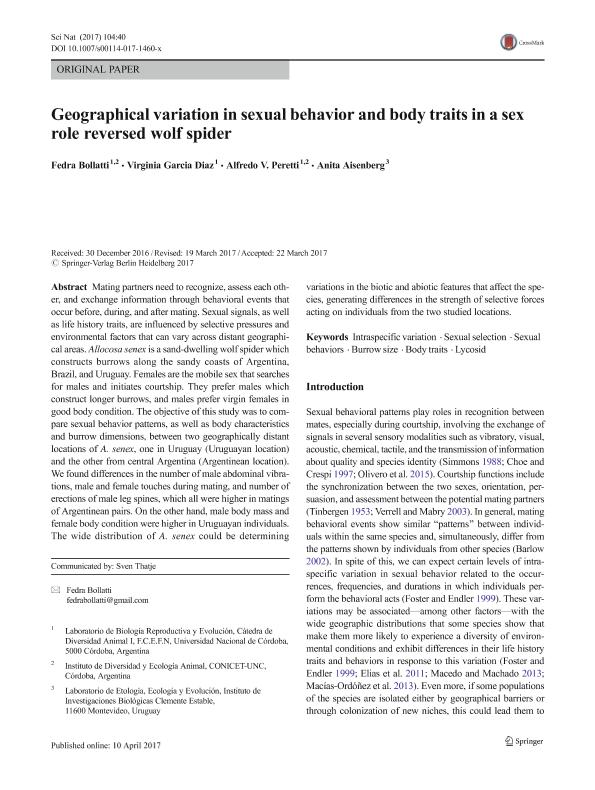Mostrar el registro sencillo del ítem
dc.contributor.author
Bollatti, Fedra Ariana

dc.contributor.author
Garcia Diaz, Virginia

dc.contributor.author
Peretti, Alfredo Vicente

dc.contributor.author
Aisenberg Olivera, Anita Diana

dc.date.available
2018-08-23T14:17:12Z
dc.date.issued
2017-06
dc.identifier.citation
Bollatti, Fedra Ariana; Garcia Diaz, Virginia; Peretti, Alfredo Vicente; Aisenberg Olivera, Anita Diana; Geographical variation in sexual behavior and body traits in a sex role reversed wolf spider; Springer Berlin Heidelberg; Naturwissenschaften; 104; 5-6; 6-2017
dc.identifier.issn
0028-1042
dc.identifier.uri
http://hdl.handle.net/11336/56750
dc.description.abstract
Mating partners need to recognize, assess each other, and exchange information through behavioral events that occur before, during, and after mating. Sexual signals, as well as life history traits, are influenced by selective pressures and environmental factors that can vary across distant geographical areas. Allocosa senex is a sand-dwelling wolf spider which constructs burrows along the sandy coasts of Argentina, Brazil, and Uruguay. Females are the mobile sex that searches for males and initiates courtship. They prefer males which construct longer burrows, and males prefer virgin females in good body condition. The objective of this study was to compare sexual behavior patterns, as well as body characteristics and burrow dimensions, between two geographically distant locations of A. senex, one in Uruguay (Uruguayan location) and the other from central Argentina (Argentinean location). We found differences in the number of male abdominal vibrations, male and female touches during mating, and number of erections of male leg spines, which all were higher in matings of Argentinean pairs. On the other hand, male body mass and female body condition were higher in Uruguayan individuals. The wide distribution of A. senex could be determining variations in the biotic and abiotic features that affect the species, generating differences in the strength of selective forces acting on individuals from the two studied locations.
dc.format
application/pdf
dc.language.iso
eng
dc.publisher
Springer Berlin Heidelberg
dc.rights
info:eu-repo/semantics/openAccess
dc.rights.uri
https://creativecommons.org/licenses/by-nc-sa/2.5/ar/
dc.subject
Body Traits
dc.subject
Burrow Size
dc.subject
Intraspecific Variation
dc.subject
Lycosid
dc.subject
Sexual Behaviors
dc.subject
Sexual Selection
dc.subject.classification
Otras Ciencias Biológicas

dc.subject.classification
Ciencias Biológicas

dc.subject.classification
CIENCIAS NATURALES Y EXACTAS

dc.title
Geographical variation in sexual behavior and body traits in a sex role reversed wolf spider
dc.type
info:eu-repo/semantics/article
dc.type
info:ar-repo/semantics/artículo
dc.type
info:eu-repo/semantics/publishedVersion
dc.date.updated
2018-08-17T14:28:54Z
dc.identifier.eissn
1432-1904
dc.journal.volume
104
dc.journal.number
5-6
dc.journal.pais
Alemania

dc.journal.ciudad
Berlin
dc.description.fil
Fil: Bollatti, Fedra Ariana. Consejo Nacional de Investigaciones Científicas y Técnicas. Centro Científico Tecnológico Conicet - Córdoba. Instituto de Diversidad y Ecología Animal. Universidad Nacional de Córdoba. Facultad de Ciencias Exactas Físicas y Naturales. Instituto de Diversidad y Ecología Animal; Argentina
dc.description.fil
Fil: Garcia Diaz, Virginia. Universidad Nacional de Córdoba. Facultad de Ciencias Exactas, Físicas y Naturales. Cátedra de Diversidad Animal I; Argentina
dc.description.fil
Fil: Peretti, Alfredo Vicente. Consejo Nacional de Investigaciones Científicas y Técnicas. Centro Científico Tecnológico Conicet - Córdoba. Instituto de Diversidad y Ecología Animal. Universidad Nacional de Córdoba. Facultad de Ciencias Exactas Físicas y Naturales. Instituto de Diversidad y Ecología Animal; Argentina. Universidad Nacional de Córdoba. Facultad de Ciencias Exactas, Físicas y Naturales. Cátedra de Diversidad Animal I; Argentina
dc.description.fil
Fil: Aisenberg Olivera, Anita Diana. Instituto de Investigaciones Biológicas Clemente Estable; Uruguay
dc.journal.title
Naturwissenschaften

dc.relation.alternativeid
info:eu-repo/semantics/altIdentifier/doi/http://dx.doi.org/10.1007/s00114-017-1460-x
dc.relation.alternativeid
info:eu-repo/semantics/altIdentifier/url/https://link.springer.com/article/10.1007%2Fs00114-017-1460-x
Archivos asociados
